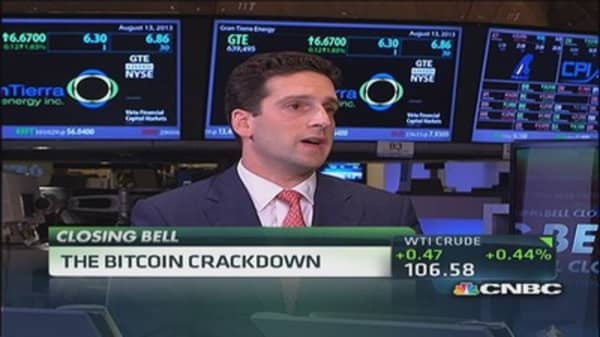Virtual currency bitcoin is to be investigated by both the FBI and the Senate Committee that oversees the Department of Homeland Security (DHS).
The DHS was sent a letter on Monday from the Committee on Homeland Security and Governmental Affairs asking for any information, plans or strategies on how it currently or plans to treat virtual currencies, including bitcoin.
The letter, posted on the Committee's website, explains the attractiveness of the currency for investors and entrepreneurs with its potential for profit and quick payment solutions. But it also warns that its "near anonymous and decentralized nature has also attracted criminals who value few things more than being allowed to operate in the shadows".
(Read more: NY regulator investigating bitcoin practices)
The Committee indicates that it has initiated an inquiry into virtual currencies because they are an important emerging area and urges the DHS to reply with information before the end of the month.
"As with all emerging technologies; the federal government must make sure that potential threats and risks are dealt with swiftly; however, we must also ensure that rash or uninformed actions don't stifle a potentially valuable technology," Committee Chairman Thomas Carper and ranking member Tom Coburn said in the letter addressed to Secretary of Homeland Security Janet Napolitano.
Meanwhile, a commerce, justice and science bill from July requests an FBI briefing on the subject of bitcoins and money laundering.
"The Committee directs the FBI, in consultation with the Department and other Federal partners, to provide a briefing no later 120 days after the enactment of this Act on the nature and scale of the risk posed by such ersatz currency, both in financing illegal enterprises and in undermining financial institutions," said the bill, which was posted on the Committee's website, and reported Tuesday by several industry blogs.
Jon Matonis, executive director of the Bitcoin Foundation, which aims to promote and protect the cryptocurrency, told CNBC that the wording of the bill is the type that encourages innovative startups to seek out more acceptable international jurisdictions.
"It is difficult to see how this could be favorable for the U.S. in trying to attract bitcoin technology start-ups," he said.
(Read more: Beware of bitcoin-related Ponzi schemes, says SEC)
Bitcoin is a virtual currency that allows users to exchange online credits for goods and services. While there is no central bank that issues them, bitcoins can be created online by using a computer to complete difficult tasks, a process known as mining. Currently one bitcoin is worth just over $111.
A leaked internal document from April 2012 revealed the FBI had concerns that the digital payment system was helping criminals hide from authorities and anticipated increased money laundering activities for bitcoin.
(Read more: What Is Bitcoin?)





